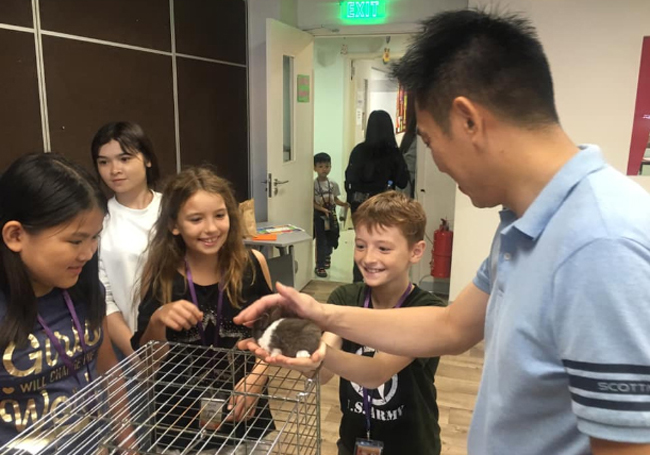
Mr Chu delivering a lecture on International Relations, a course offered in SCIA-UOL International Foundation Programme. Photo Supplied
Singapore (Cambodia) International Academy (SCIA) strives on a dedicated mission: To nurture “future ready students” for the fast-evolving workforce.
For over a year, educators at SCIA have taken education to a different level in the Kingdom, transcending the regimented rote learning academic style to more contemporary teaching methods that allow students to grasp relevant skillsets before they enter the workforce.
Besides the usual academic curriculum, SCIA students learn diverse relevant skills, from leadership to entrepreneurship, at a very young age at its campus located in Phnom Penh. Change is needed fast, and SCIA is doing that in its classrooms.
The dramatic changes happening at workplaces as businesses transform rapidly under the unstoppable wave of new disruptive technologies could bring significant influences on jobs and the existing workforce.
Employers and employees may be forced to revamp the way they function in the technology-driven work environment which focuses heavily on interconnectivity, automation and access to real-time data.
Hence, the outlook towards the education system and human capital development needs to be viewed from a different perspective altogether.
Besides developing hard skills to meet today’s demands, graduates with soft skills are sought after. Competencies in effective communication, higher order thinking, problem-solving and teamwork are some of the soft skills that are in high demand from employers in the new-age industries.

Students at the zoologist station in the recent Open House, where they experience different careers. Photo Supplied
“The world is focusing on 21st century skills. We are no longer in the traditional industrial revolution period. It is now Industrial Revolution 4.0, with companies announcing the 5G (fifth generation telecommunication services) network,” said Mr Anselm Chu, SCIA Managing Director & School Director.
He has a point. The World Economic Forum 2016 report ‘The Future of Jobs and Skills’ has cautioned of the drastic changes to come.
“By one popular estimate, 65 per cent of children entering primary school today will ultimately end up working in completely new job types that don’t yet exist,” said the report.
But are local education institutions ready to meet this challenge?
While the Kingdom’s education system has witnessed major improvements over the years, there will be a need for educators to groom graduates for the sophisticated job market.
Chu added, “The industry is transforming so fast that there is a skills gap, so companies need to invest in training the fresh graduates. Universally, every country is grappling with this problem [unable to provide skilled graduates needed by emerging industries]. Schools have to look at bigger context and not just grades and exams.”

SCIA Primary students perform Wushu during Sports Day.
The 21st century skills is nothing complex; it is going back to the basics. Schools can provide platforms for Communication, Collaboration and Competency.
“Communication is very important. If you cannot communicate, no one can understand you. Project work in teams, and co-curricular activities (CCAs) give opportunities for students to collaborate and learn beyond the classroom. The third is competency. Every educator must know what competencies are required to prepare students for their future,” Chu explained.
“Along with STEM (Science, Technology, Engineering & Mathematics), SCIA has listed leadership and entrepreneurship in the curriculum. You need both leadership skills and entrepreneurial mindset to deal with situations and challenges. Schools cannot solely be based on papers and academic grades. The integral part of the bigger picture is the holistic development of the student or at SCIA, the ‘holistic education learning model (HELM)’, encompassing programmes that help shape both hard and soft skills in students.” Chu concluded.







